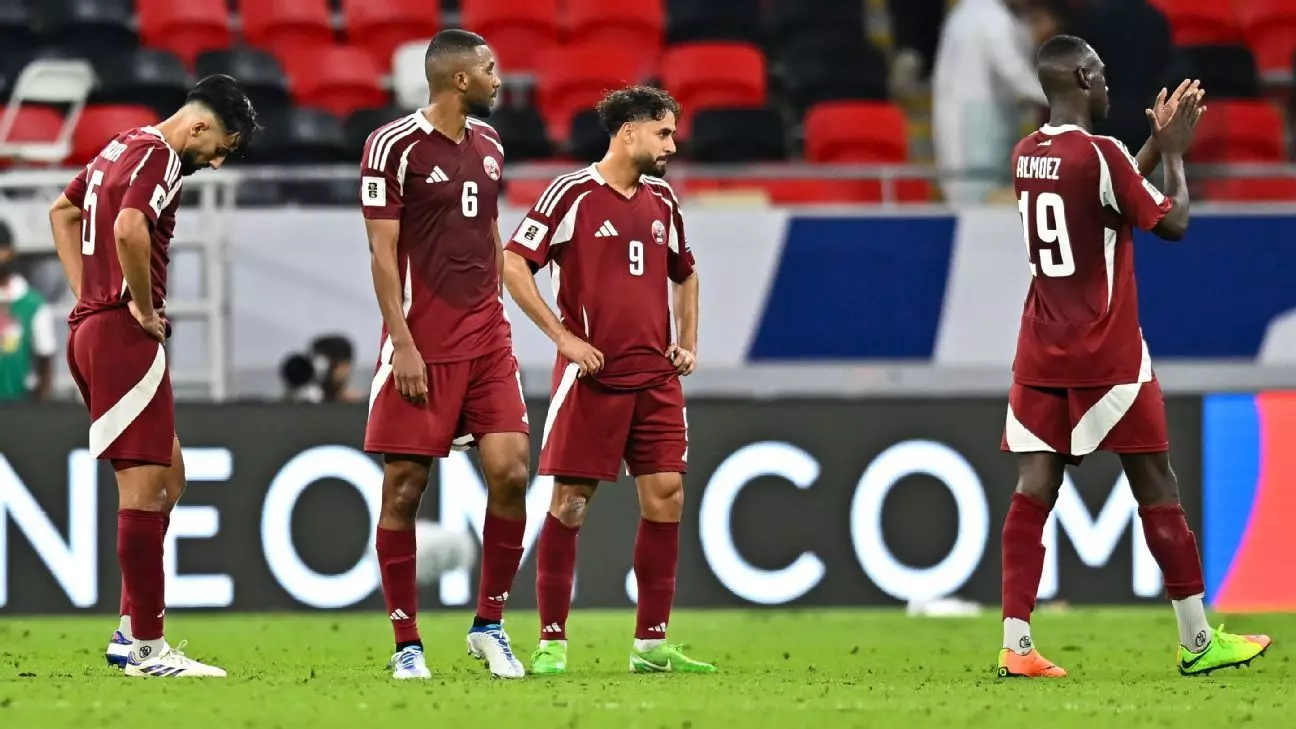As the FIFA World Cup approaches, the spotlight is once again on Qatar, a nation that made an ambitious debut as the host in 2022. The challenge before them in the run-up to the 2026 World Cup has now transformed from one of aspiration to one of immediate necessity; they must qualify on merit. Given the expansion of the tournament to 48 teams and the assured allocation of eight spots for Asian teams, there seemed to be a clear path for Qatar. Their recent triumphs in the AFC Asian Cup in 2019 and earlier this year only fueled expectations. However, the current reality paints a rather bleak picture for the Qatari national team. After six matches in the final round of qualifying, they find themselves languishing in fourth place in a relatively competitive Group A, which raises critical questions about their preparations and strategies.
Qatar’s record during the qualifiers has been troubling. With only two wins and a total of seven points, they sit three points behind third-placed United Arab Emirates and six points away from securing Uzbekistan’s automatic qualifying spot. Their defensive woes are particularly alarming; they have conceded 17 goals, the worst record among all participating teams. Conceding five goals in a humiliating defeat against the UAE, where Qatari defenders seemed helpless against Fabio Lima’s striking prowess, showcased their frailties. Adding to the discontent, a lackluster draw against North Korea, a team that had not qualified for the World Cup previously, raises serious red flags regarding the team’s focus and efficacy.
The trajectory of Qatar’s national team raises the question: how did a side that recently celebrated continental success find itself in such a precarious position? At first glance, it might appear that they have chosen to focus exclusively on short-term success, sidelining the crucial aspects of long-term development. The presence of seasoned players, such as Boualem Khoukhi and Abdulaziz Hatem, notwithstanding their declining years, may point to an overreliance on established figures. Nonetheless, there’s a more complex narrative at play.
The backbone of their past successes comprised largely young talents like Akram Afif and Almoez Ali, both of whom, at 28, still bring significant experience to the table. While some up-and-coming players, such as 19-year-old Ibrahim Al-Hassan, are beginning to make strides, there seems a lack of clarity in how these talents should be integrated into the current squad. The reality of needing to find immediate results often hampers systematic transitions, making it difficult to cultivate future stars alongside relying on experienced veterans.
To add to the complications, there appears to be a crisis of identity within the team. Under coach Tintín Márquez, the side seems caught between experimenting with various formations—fluctuating between 5-3-2, 4-3-3, and less popular 4-4-2 setups. This inconsistency has made it harder for players to harmonize on the pitch, leading to a disjointed performance in crucial matches. Offensive roles have not been clearly defined, particularly affecting key players like Afif. Such instability reflects a deeper challenge facing Qatar: defining a coherent philosophy amidst evolving dynamics.
Leadership on the field and within the dressing room poses another significant hurdle for Qatar. The departure of long-serving figures, including the formerly influential captain Hassan Al-Haydos, has left a vacuum that is not easily filled. While Akram Afif has taken over captaincy, his style leans towards quiet brilliance rather than vocal leadership—an essential characteristic that may be lacking in high-pressure situations.
As the national team grapples with an identity crisis on and off the pitch, these changes culminate in a testing situation. The new leadership must inspire a sense of unity and purpose, particularly when the pressure intensifies as matches become pivotal for World Cup aspirations. Qatar’s squad, now in transition, must find a way to meld the younger and older generations effectively—ensuring that experience aids rather than hinders their quest for qualification.
Despite the challenges enveloping the team, the path ahead is not devoid of prospects. Qatar still has four vital matches left in the qualifiers, and the focus must shift towards gaining momentum. Fortifying their leaky defense and restoring confidence will be paramount for a successful push towards at least a top-four finish. The challenge remains to balance short-term objectives with long-term goals, fostering a team identity that encapsulates the evolving landscape of Qatari football.
The next matches will not only determine Qatar’s fate in the World Cup qualifiers but will also provide an opportunity for the team to reassess its strategies, instill a collective identity, and develop the leadership required to navigate the tumultuous journey ahead. Only through this reflective process can Qatar find its way back to prominence on the international stage.
